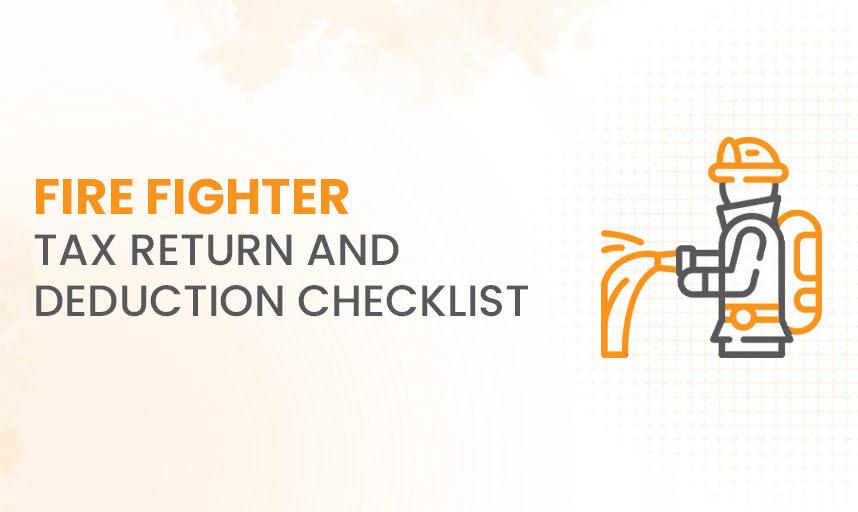Fire Fighter Tax Return and Deduction Checklist

As a firefighter, your job is demanding and crucial.
You put your life on the line every day to protect your community.
While battling fires and saving lives is your top priority, taxation can feel challenging.
But fear not.
Here is a blog that guides you with a checklist for tax returns and deductions.
By following it, you can maximise your refund and boost your taxable income.
So let’s begin!
What You'll Need To File Your Return?
So let’s start with the first step.
To get started, you’ll need an income statement from your employer (previously called a payment summary or group certificate).
This document summarises your salary, wages, allowances, and bonuses for the financial year.
Your employer should automatically lodge this with the Australian Taxation Office (ATO). Once lodged, a registered tax agent can download the information for you.
Firefighter-Specific Deductions Explained (In A Table For Easy Reading)
There are experts like KPG Taxation, that can help you to lodge your return. However, here is a table consisting of a fire-fighter specific deduction checklist, in case you want to lodge it yourself:
| Category | Deductible Expenses |
| Travel |
|
| Clothing and Equipment |
|
| Training and Education |
|
| Other Expenses |
|
Detailed Explanation Of Deductible Expenses
1 Travel
You can claim car expenses (fuel, tolls, parking) for travel between stations, community events, or other work locations. If you travel for work and stay overnight (e.g., interstate fire response, training course), claim meal and accommodation expenses.
You can also claim travel allowances received from your employer, but only if they meet specific ATO criteria (refer to table for details).
2 Clothing and Equipment
All expenses related to compulsory firefighter uniforms and protective gear (boots, helmets, gloves) are deductible. This includes cleaning, repairs, and replacements due to wear and tear.
Tools and equipment specifically required for work (climbing harnesses, breathing apparatus) and their insurance are also claimable.
3 Training and Education
Upgrade your firefighting skills! Claim the costs of courses, seminars, and training directly related to your job (e.g., first aid certificate renewal, advanced firefighting techniques).
Physical training exceeding the basic level required for all firefighters (e.g., training for a special rescue team) is also deductible.
4 Other Expenses
Several other work-related expenses can be claimed. This includes a portion of your phone and internet costs if you use your personal device for work and aren’t reimbursed (keep records for claims over $50). Firefighting-specific needs like stationery (notebooks, pens) and approved self-education materials (textbooks, online resources) are also deductible.
Don’t forget about protective items like sunglasses, sunhats, and sunscreen needed for work. Overtime meal allowances paid under an official agreement with your employer are claimable as well (refer to your income statement for allowance amount).
Firefighter Non-Deductible Expenses
While many expenses firefighters incur can be claimed as tax deductions, some important categories are not deductible. Understanding these non-deductible expenses can help you avoid including them in your tax return and potentially delaying your refund.
| Category | Non-Deductible Expenses | Explanation |
| Clothing | Regular clothing that can be worn outside of work (e.g., t-shirts, sweatpants) even if purchased specifically for work. | Even if you only wear these clothes to work and buy them specifically for that purpose, if they can also be worn in everyday situations, they are considered regular clothing and not deductible. |
| Personal Protective Equipment (PPE) Provided by Employer | Personal protective equipment (PPE) provided by your employer (e.g., helmets, boots, gloves). | The cost of PPE you are given by your employer is not a work-related expense you can claim. |
| General Fitness and Health | General fitness courses, gym memberships, or other health-related expenses to maintain basic fitness. | The ATO considers these expenses to be related to your general health and well-being, not specifically required for your firefighting duties. Maintaining a basic level of fitness is a personal responsibility. |
| Pre-employment Costs | Driver’s licence renewal or pre-employment medical examinations. | These costs are considered a requirement to be eligible for the job, not an ongoing work-related expense. |
| Commuting | Travel between home and work, even if you live a long distance away. | The cost of commuting from home to your regular work location is not considered a work-related expense. There are exceptions for travel between workplaces or to temporary work locations. |
| Personal Expenses |
|
These expenses are considered personal in nature and not directly related to carrying out your firefighting duties. |
Conclusion
Filing your tax return as a firefighter is not just a routine task; it’s an opportunity to maximise your refund and ensure financial stability.
But by understanding the deductions and with the help of KPG Taxation, you can handle the tax process with confidence.
The tax agents at KPG Taxation will further optimise your returns and alleviate any tax-related stress.
- Categories
- Tax Return

Focus On Growing Your Business, Leave The Accounting On Us!
- Income Tax : File your taxes & get the best claims & returns.
- Accountancy : Hire expert accountants to manage your transactions.
- Bookkeeping : Let us handle your record books and expense reports.
- Business Advisory : From company set-up to payroll, we handle it all.



